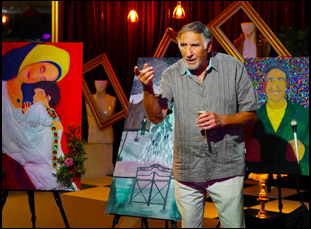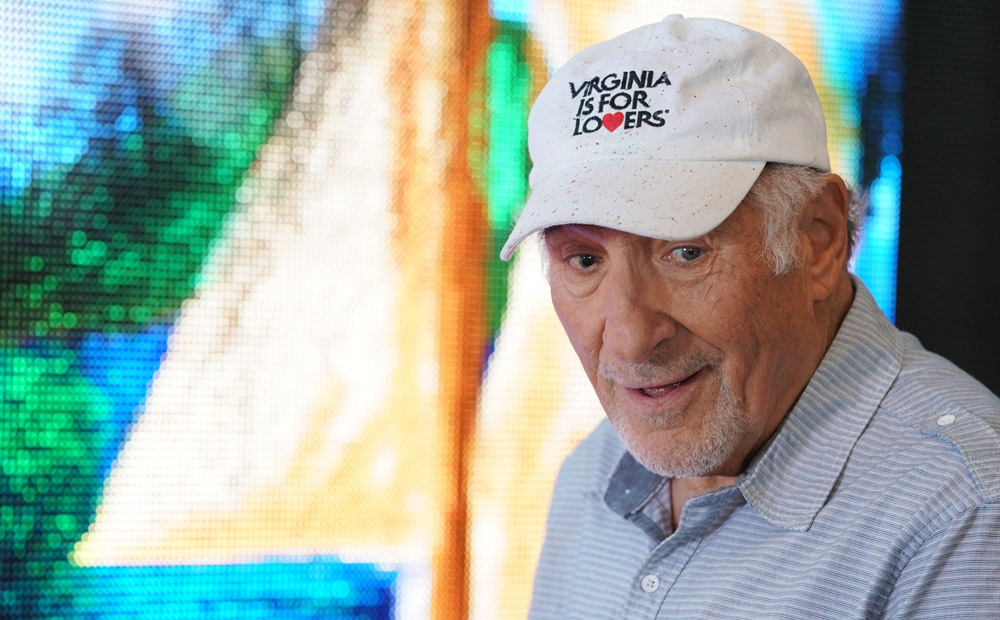Like his father Mordecai who took up painting later in life, Marvin Samel found he was ready to be an artist once he had something to say. It wasn’t something he had been expecting, selling his stake in the cigar company he had invested the better part of his life into around the time he learned that his mother would need extra care when she was diagnosed with Alzheimer’s, but after he had poured his memories down on paper to make sure the family history wouldn’t be lost, it started to resemble a script, with people around him suggesting that not only he should pursue a film, but given his passion for storytelling, he should attempt to direct it himself.
Samel may have resorted to a few MasterClasses online for ideas about how to run a set, but arranged a production much like he would one of his businesses by bringing in the best people he could find — your usual first-time indie director generally doesn’t have the same casting director as “Succession,” but after enlisting Avy Kaufman, he could get a meeting with the likes of Judd Hirsch. (A date over pizza in which “The Fabelmans” actor was convinced and he was up to the job and put in a call to his former “Taxi” co-star Carol Kane to join him.)
The end result, “iMordecai” proves the most important thing is to have a tale worth telling, as Samel finds a way into recounting his family’s history through the visits his gregarious father (played by Hirsch) would make to a local cell phone store to learn how to use his smartphone, though he ends up doing far less listening than talking as an employee named Nina (Azia Dinea Hale) becomes interested in every tale he wants to share, from surviving the Holocaust to his more recent exploits around Miami. The two strike up a friendship, which helps Mordecai cope with the deflating memory loss that his wife Fela (Kane) is experiencing back home and while both he and his son Marvin (Sean Astin) try their best to adjust to a new normal, they find themselves navigating uncharted territory.
Both on screen and off, the Samels acquit themselves well as “iMordecai” carries the spirit of Mordecai’s storytelling that surely enraptured friends and family around the dinner table in the past and now has opened up for all to be entertained by when Marvin took the risk of putting everything out there like this, and as the film is now available everywhere on demand and on digital and can be seen on the big screen this evening as the closing night film at the San Luis Obispo Film Festival, Samel reflected on taking an unconventional path towards filmmaking, rolling with the punches and making memories while living out his parents’ past.

Filmmaking was an interest the way pitching for the Yankees is an interest. [laughs] It just felt like this unattainable dream. But the confluence of selling my cigar company, my wife giving birth to our twins, and then when the twins were two months old, my mother being diagnosed with Alzheimer’s inadvertently led to me becoming a filmmaker. I simply started writing the stories of my family’s life, and in particular, my dad, who is a character and [remained] hopeful with my mother’s Alzheimer’s diagnosis. And once I took a step back and realized these characters are cinematic – forget that they’re my parents – I said, “You know what? Maybe there’s something there.”
And then my father started taking private lessons that used to be offered through Apple [about his iPhone] and you’re supposed to take two or three lessons and then graduate iPhone for Beginners classes, but he took lessons for months, so I’m like, “What the hell is going on here?” And I sneak up on him and there’s my dad holding court with like young men and women of very different backgrounds than my father who’s in his eighties at this point and they’re laughing, and crying, deeply affected by the stories he’s telling. That was my Eureka moment. I thought, “This is the vehicle for a film about the unlikely friendship between a young girl who teaches lessons at a tech store and a Holocaust survivor in the twilight of his life. What would that unusual friendship look like?”

What I’ve learned in life as a business owner is don’t ever try and be the smartest person in the room. So I searched out talent and kinship from people that were the best in their fields, starting with my producer Dahlia Heyman, my executive producer Allen Bain, my editor Rick Grayson, my cinematographer Will Turner, my composer Matt Kajcienski and our casting director Avy Kaufman, who’s podiumed more Oscar winners than anyone in history, and our amazing cast Judd Hirsch, Carol Kane, Sean Astin, Stephanie J. Block, Azia Denia Hale, and everyone gave it their all. I had zero experience in any of this and it led to a camaraderie, where it was like we were this band of brothers and sisters working together.
I’ll give you a quick story. I didn’t know that you’re supposed to picture lock your film, and then you reach out to the composer. All I had was a script, and I’m sleeping over in my composer’s home and talking about how the score’s going to sound when we make a movie, and experienced filmmakers are like, “That’s crazy.” Then as a first-time filmmaker, I didn’t realize that most of the people on set don’t read your script, but I refused for that to happen. If you were the cinematographer, or if you were the transportation person, you had to read the script, if you’re going to be on set. That’s kind of how I ran my cigar company – we’re all in it together, and I brought that ethos to the film set.
It looks like it paid off. What was it like casting your family and even yourself in this film? Is that a surreal experience?
Imagine you’re directing yourself, played by Sean Astin, and in between takes you have to give direction, “So here’s how I would do it, Sean, as me.” With Sean, it was surreal, but I didn’t have to give him much direction because my father was on set every single day, arguing with me as they argue in the film together. And he’s [like] “Ah, this is not how it happened,” or “Madvin’s fucking it all up” in front of a hundred people sometimes. [laughs] Sean was a sponge who was able to observe the dynamics between my dad and I and my wife and I, and he channeled that into his role playing me.
Is it true that’s actually your father’s artwork in the film?
Yeah, my dad became an artist in his late seventies. He would draw a little here and there, but he picked it up and when he started listening to the Klezmer music of his youth, I would show him songs on Apple Music, he would listen to those songs, and all of a sudden he just starts painting. Some of the paintings are not my dad’s, but all the paintings in the apartment are all my father’s, and all the paintings on the walls of the art gallery at the end of the film are all my father’s real paintings.

Every shot that we constructed, my parents and I walked that earth and that realism was very important. There were times I’d do a quick shot on the beach, for instance and I could see into the window of the apartment that I moved into when I moved from Manhattan to South Beach in 2004. Or the ending of our film takes place on Lincoln Road, my parents’ favorite spot, so it was a lot of fun from that aspect of saying, “All right, this is where we’re going” and every place looked not only familiar, but it felt like home.
Was there anything that may have happened during the shoot that you may not have expected, but you came to embrace it?
There were so many. You write a script, you work with your director of photography, Will Turner, six weeks straight, seven days a week, shot listing, location scouting, and you can make all the plans in the world, but I’ll give you one instance. It’s my very first time on a film set, and I’m directing the Jeep scene in which it’s supposed to be raining, so we have this big truck that has a water tank on top of it that’s ready to pour rain down. Of course, it was pouring rain anyways that day and there was a miscommunications between our locations department and the police department who are there to ensure there’s no incidents and that the streets [were] blocked off. Instead of having four hours in my very first time on set on a film directing, we had 40 minutes., so I’m panicking. I said, “All right, let me get this as quick as possible. We ran one take through of the entire scene, and they rolled down the window and I gave my first note ever — “Judd, is there any way you can give me a little more emotion with your facial expressions in the next take?” [Judd said] “What the hell are you talking about? The camera’s on Carol [Kane]. “Welcome to movie making, ladies and gentlemen.” [laughs]

That was a happy accident. We we were all set to head to my father’s birth town of Jadów Luski, Poland. And COVID hit. My producer Dahlia Heyman felt all along that these flashback scenes should be told from the eyes of a child and what better way to do that than through animation. Eventually I agreed and only on the terms that we’re going to hire the best animation studio out there, so we worked with this company, Chaos Emporium, approximately 100 animators, who took 10 months for five minutes of animation.
What’s it been like getting it out into the world?
A rollercoaster, like the movie. The film business is a very tough business, and there are many things that have to come together perfectly. But being able to see every aspect of the filmmaking business — I started out as a writer, then a producer, then a director, a financier, [and eventually] a sales agent and now a distributor. [I had] help along the way, of course, but I got to witness every aspect of the filmmaking business. It’s a very exciting business, but it’s not for the faint of heart and now we’re coming to video on demand and I’m hoping people give us a shot. You can my follow my TikTok and follow my father Mordecai’s TikTok MordecaiSamel. You’ll see some funny stuff. I don’t have the budget that some of the other films have to throw this film in your face a hundred times, but I’m hoping word of mouth will spread because this is a film that I feel is going to make you laugh. It’s going to make you cry. It’s going to make you think of your family. If you have a family, this is a movie for you.
“iMordecai” is now available on VOD and Apple TV.




